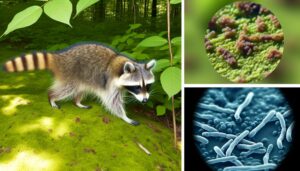How You Can Legally Have a Pet Raccoon in NJ
Owning a pet raccoon in New Jersey is permitted but subject to strict regulations. Prospective owners must obtain a Captive Game Permit and a Veterinary Health Certificate.
The NJ Division of Fish & Wildlife enforces compliance inspections and mandates specific housing standards. Raccoons pose health risks, such as rabies, requiring vaccinations and regular veterinary care.
They also have complex dietary needs and potentially problematic behaviors. Additionally, non-compliance with state laws may result in fines or confiscation.
For those exploring alternatives, small mammals, birds, or reptiles might be suitable. Continue to explore for detailed regulatory insights and care requirements.

Key Takeaways
- Pet raccoon ownership in New Jersey requires obtaining a Captive Game Permit and Veterinary Health Certificate.
- Owners must adhere to housing standards and undergo compliance inspections by the NJ Division of Fish & Wildlife.
- Strict regulations ensure responsible ownership, including regular veterinary check-ups and thorough background checks.
- Raccoons can carry zoonotic diseases, making proper vaccination and regular veterinary care essential.
- Non-compliance with state and local regulations may lead to legal consequences, including fines or confiscation of the raccoon.
New Jersey Laws on Pet Raccoons
New Jersey law strictly regulates the ownership of pet raccoons, requiring potential owners to obtain specific permits and adhere to strict guidelines. The state's thorough legal framework is designed to ensure both public safety and the well-being of the raccoons.
Regulations cover various aspects, including housing, dietary requirements, and medical care provisions. Potential owners must demonstrate their ability to meet these strict conditions, which include maintaining a habitat that mimics the raccoon's natural environment to the greatest extent possible.
The law also mandates regular veterinary check-ups to monitor the raccoon's health and prevent the spread of zoonotic diseases. These measures are intended to balance the interests of the animals, the owners, and the broader community.
Required Permits and Licenses
Understanding the regulatory framework for keeping a pet raccoon in New Jersey requires familiarity with state wildlife regulations and the specific steps involved in the application process.
Prospective owners must obtain the appropriate permits, which are governed by the New Jersey Division of Fish and Wildlife. The application process involves a series of detailed requirements designed to guarantee both human safety and the well-being of the raccoon.
State Wildlife Regulations
To legally own a pet raccoon in New Jersey, individuals must obtain specific permits and licenses as stipulated by state wildlife regulations. These regulations are designed to guarantee the welfare of the raccoons and the safety of the community. Detailed provisions mandate the acquisition of a Captive Game Permit, Veterinary Health Certificate, and adherence to housing standards. The table below summarizes the key requirements:
| Requirement | Description | Responsible Authority |
|---|---|---|
| Captive Game Permit | Needed to legally keep a raccoon | NJ Division of Fish & Wildlife |
| Veterinary Health Certificate | Health check by a licensed veterinarian | Licensed Veterinarian |
| Housing Standards | Adequate housing specifications | NJ Division of Fish & Wildlife |
| Annual Renewal | Permit needs yearly renewal | NJ Division of Fish & Wildlife |
| Compliance Inspections | Periodic inspections for adherence | NJ Division of Fish & Wildlife |
Detailed adherence ensures responsible raccoon ownership.
Application Process Steps
Obtaining the necessary permits and licenses to own a pet raccoon in New Jersey involves a series of well-defined steps that guarantee compliance with state wildlife regulations.
First, prospective owners must submit a completed application form to the New Jersey Division of Fish and Wildlife. This form requires detailed personal information and a justification for possessing a raccoon. Additionally, applicants must demonstrate knowledge of raccoon care and provide evidence of a suitable habitat. A non-refundable fee accompanies the application.
Once submitted, the Division conducts a thorough review, including background checks and potential site inspections. If approved, the permit holder must adhere to periodic inspections and renew the license annually, ensuring ongoing compliance with state laws and animal welfare standards.
Health and Safety Concerns
Securing the health and safety of both the raccoon and the household demands careful consideration of zoonotic diseases, appropriate nutrition, and the animal's innate behaviors.
Raccoons are potential carriers of diseases such as rabies, leptospirosis, and raccoon roundworm, which can pose significant health risks to humans and other pets. Proper vaccination and regular veterinary check-ups are essential to mitigate these risks.
Additionally, raccoons have specific dietary needs that must be met to prevent malnutrition and obesity. Their natural behaviors include climbing, foraging, and nocturnal activity, which may require special accommodations to prevent accidents or escape attempts.
Understanding these factors is vital to guarantee a safe and healthy environment for both the raccoon and the household members.
Daily Care Needs
Addressing the daily care needs of a pet raccoon in New Jersey requires a thorough understanding of their feeding and nutrition requirements, as well as the necessary habitat maintenance. Proper dietary management promotes the animal's peak health, while regular cleaning and enrichment of their living environment are essential for their well-being.
This section will outline the necessary practices to maintain a healthy and safe lifestyle for a pet raccoon.
Feeding and Nutrition
Proper feeding and nutrition are vital to maintaining the health and well-being of a pet raccoon in New Jersey. Raccoons are omnivores, requiring a balanced diet that includes fruits, vegetables, proteins, and grains. A diet replicating their natural intake is essential: fruits like apples and berries, vegetables such as carrots and leafy greens, and proteins like cooked chicken or eggs.
Commercially available raccoon feed can also supplement this diet. Vitamin and mineral supplements might be necessary to prevent deficiencies. Fresh, clean water should always be accessible. Excessive feeding of sugary or processed foods can lead to obesity and health issues.
Regular veterinary consultations are recommended to tailor a diet specific to the individual raccoon's needs.
Habitat Maintenance
Maintaining a clean and enriching habitat for a pet raccoon necessitates daily attention to hygiene, environmental enrichment, and spatial needs. This safeguards the raccoon's well-being and prevents health issues.
Daily habitat maintenance involves:
- Cleaning: Regularly remove waste and sanitize surfaces to prevent bacterial growth and disease.
- Enrichment: Provide a variety of toys and climbing structures to stimulate mental and physical activity.
- Feeding Stations: Ensure food and water bowls are cleaned daily to uphold hygiene.
- Bedding: Replace bedding materials frequently to guarantee a clean and comfortable resting area.
- Security: Check enclosures for any potential escape routes or hazards to ensure safety.
These practices are essential for maintaining a healthy and stimulating environment for your pet raccoon.
Potential Behavioral Issues
Raccoons, despite their charming appearance, can exhibit a range of behavioral issues that may pose challenges for pet owners in New Jersey. These nocturnal animals are naturally curious and highly intelligent, which can lead to destructive tendencies. They are known to rummage through garbage, dismantle household items, and even escape enclosures.
Additionally, raccoons have a potent instinct for foraging, often resulting in conflict with human activities. Aggression can also be a concern, especially during mating season or when they feel threatened. Furthermore, their social behaviors can vary, making them unpredictable and difficult to train.
Understanding these behavioral characteristics is essential for potential pet owners who aim to provide a safe and nurturing environment for raccoons.
Ethical Considerations
Considering the ethical implications of keeping a pet raccoon in New Jersey requires a thorough examination of both the animal's welfare and the potential impact on local ecosystems.
Ethical considerations include:
- Animal Welfare: Raccoons are wild animals with specific needs that are challenging to meet in a domestic setting.
- Health Risks: Raccoons can carry diseases that are transmissible to humans and pets, such as rabies and roundworms.
- Environmental Impact: Introducing non-native species into local ecosystems can disrupt existing wildlife and plant life.
- Behavioral Issues: Wild instincts may lead to aggressive or destructive behavior, posing safety risks.
- Legal Responsibilities: Owners must comply with state and local regulations, which may have stringent requirements for exotic pets.
These points underscore the complexities involved in ethically keeping a raccoon as a pet.
Alternatives to Pet Raccoons
Exploring alternative pets to raccoons can provide options that are both safer and more suited to a domestic environment, ensuring better welfare for the animals and fewer risks for the owners.
Small mammals such as guinea pigs, hamsters, and rabbits are well-documented for their adaptability to home settings and ease of care.
Birds like parakeets or cockatiels offer companionship with lower maintenance needs compared to raccoons.
Reptiles, including bearded dragons and leopard geckos, present another viable alternative, given their relatively straightforward habitat requirements.
These animals have established care guidelines, which contribute to their overall health and longevity in captivity.
Conclusion
In sum, the labyrinthine regulations and myriad considerations surrounding the ownership of pet raccoons in New Jersey serve as an indication of the state's dedication to public health, safety, and animal welfare.
Prospective raccoon enthusiasts may find comfort in the fact that the careful attention, possible behavioral unpredictability, and ethical dilemmas are all designed to guarantee a harmonious coexistence between humans and wildlife.
After all, who wouldn't enjoy the bureaucratic dance required to cuddle a nocturnal forager?






